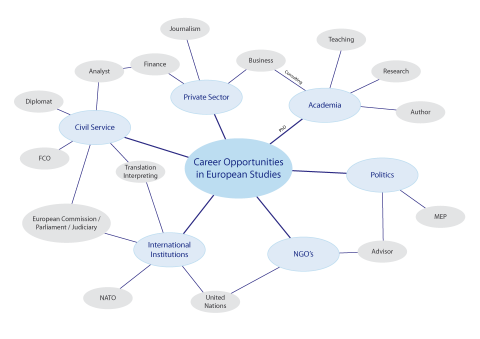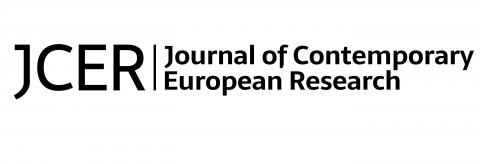Careers
For graduates
There is a diverse range of prospective careers including academia, diplomacy, working in governmental organisations, working in international institutions such as the European Union, NATO or the United Nations, translation and interpreting, teaching and research, journalism, finance, marketing and international business.

Resources
Students’ Skills, Employability and the Teaching of European Studies: Challenges and Opportunities
by Heidi Maurer and Jocelyn Mawdsley
Skills and employability are increasingly viewed as crucial issues in curriculum design and teaching, while simultaneously perceived as potentially detrimental to academic standards. This article comparatively analyses the current European employability agenda and how it was implemented in Britain and the Netherlands. In addition, this article critically reflects on the challenges and opportunities of integrating such an agenda into an EU study curriculum, by drawing on practical examples from the universities of Maastricht and Newcastle.
Published in European Political Science (doi:10.1057/eps.2013.34)
Teaching, Learning and the Profession
A Virtual Perpetual Archive on Teaching European Studies
In 2014, the JCER introduced a new section on Teaching, Learning and the Profession with a specific focus on European Studies. We hope to expand on this section in future Volumes. The articles and other relevant material will be curated here, as a Virtual Perpetual Archive.
The study of European Studies requires the synthesis of multiple and diverse insights from a wide variety of academic disciplines in the social sciences, humanities, arts and economics. This means that European Studies curricula tend to respond in a highly engaging way by adopting a rather more multi and interdisciplinary approach to teaching and learning than perhaps other subject areas do. This section is thus intended as a forum for the profession to debate issues associated with this teaching and learning approach.
European Union Studies as a distinct aspect of European Studies, is inherently characterised by a dynamic, fast‐evolving body of knowledge, and also necessitates the development of certain core competencies such as understandings of EU administration, EU governance and the management of EU institutions. This in turn necessitates a particular emphasis within the profession on continuous learning and development, which presents specific challenges, which can also be given a voice in this section.
The fast‐evolving knowledge base referred to above places significant importance on the need for innovation in teaching. The EU, as we know, is an important driver for lifelong learning and the development of a knowledge-based economy and society. This impetus manifests itself particularly in the European Studies field through increasing pressures on the academic community to disconnect from traditional teaching methods characterized by passive delivery and limited class participation. In their place, there is significant and increasing momentum for the adoption of new and innovative teaching methods based on the development of negotiation, strategic thinking, and problem-solving techniques and ones that are embedded in new technologies and social media.
Karen Heard-Laureote & Simon Lightfoot
Research Articles
Published in the Journal of Contemporary European Research (2014) Volume 10, Issue 4
Introduction: Teaching, Learning and the Profession by Karen HEARD-LAUREOTE & Simon LIGHTFOOT
Transition to Higher Education? by Patrick BIJSMANS & Pia HARBERS
Engagement as an Educational Objective by Charles DANNREUTHER
Teaching Qualitative Methods in Social Science: A Problem-based Learning Approach by Helene DYRHAUGE
The Future of European Studies: A Perspective from Ireland by Mary C MURPHY
European Studies and Public Engagement: A Conceptual Toolbox by Andreas MÜLLERLEILE
Books and Book Reviews
Teaching and Learning the European Union by Stefania BARONCELLI, Roberto FARNETI, Ioan HORGA, Sophie VANHOONACKER (eds)
Teaching Politics and International Relations by Cathy GORMLEY‐HEENAN & Simon LIGHTFOOT (eds)
Research Desigh in European Studies: Establishing Causality in Europeanization by Theofanis EXADAKTYLOS & Claudio M RADAELLI (eds)
Relevant Research Articles from Other Sources
Learning from Peers: The Role of the Student Advisor in Internationalising the European Studies Curriculum by Helen DRAKE, European Political Science (2014) Volume 13, Issue 1
Using Facebook as an Interactive Learning Environment in European Political Studies by Sarah LIEBERMAN, European Political Science (2014) Volume 13, Issue 1
Students’ Skills, Employability and the Teaching of European Studies: Challenges and Opportunities by Heidi MAURER & Jocelyn MAWDSLEY, European Political Science (2014) Volume 13, Issue 1
The Virtual Classroom: Teaching European Studies Through Webinars by Alexandra MIHAI, European Political Science (2014) Volume 13, Issue 1
Teaching European Studies: Field Trips to Brussels – an Underutilised Resource by Knut RODER, European Political Science (2014) Volume 13, Issue 1
Constructing Effective Simulations of the European Union for Teaching: Realising the Potential by Simon USHERWOOD, European Political Science (2014) Volume 13, Issue 1
The JCMS, UACES Journal
Mapping EU Studies: The Evolution from Boutique to Boom Field 1960–2001 by John KEELER, Journal of Common Market Studies (2005) Volume 43, Issue 3
The European Studies Movement: What's in a Name? by Alan MILWARD, Journal of Common Market Studies (1975) Volume 14, Issue 1
The Organization and Govermnent of a School of European Studies by Stephen HOLT, Journal of Common Market Studies (1975) Volume 14, Issue 1


